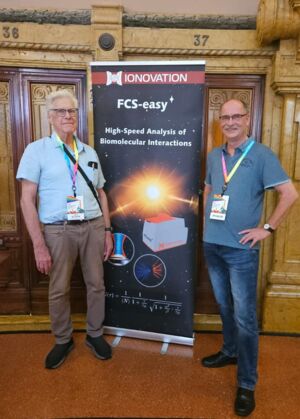Have any questions?
+44 1234 567 890
FCS-easy
High-Speed Analysis of Biomolecular Interactions

Single Molecule Fluorescence Detection
FCS-easy is a preconfigured, cost-effective fluorescence correlation spectrometer. It quantifies interactions of biomolecules, even in living cells or cell lysates. Determine High-End optical components and a data acquisition system with "the world's most precise stopwatch" from the field of quantum optics allows its unique sensitivity down to sub-pM concentrations.FCS-easy is designed for routine and screening aplications also in industrial environments, as all data is processed and stored in compliance with CFR part 11.
FCS-easy is designed for functional screening assays

- Binding / Competition / Kinetics
- Biomolecules / Nanoparticles / Chemicals
- Assaying Cells and Lysates
- Automated Serial Measurements / Affinity Screening
- Plate Formats: 96 / 384 / 1536
Extracting information from noise
FCS-easy Key Features
- 2 confocal laser lines (488nm, 633nm), CW or pulsed
- High-End TCSPC module ("time tagger" by ´Swabian Instruments")
- Motorised stage for MTPs (96, 384, 1536)
- Intuitive user interface (21 CFR part 11 compliant)
- Compatible with screening evironments
- Confocal imaging (optional)
- Fluorescence lifetime (optional)
- Benchtop device

Acknowledged by Inventors
Prof. Eliot Elson (FCS) and Dr. Karsten Gall (FIDA) discuss Ionovation‘s FCS-easy at the 12th International Weber Conference 2025 in Genua, Italy
More on FCS:

ARIES

Schematic drawing of the ARIES system. The AO unit (Magenta background) in the infinity beam path is integrated into the FCS unit (green background). (DM: dichroic Beamsplitter, APD: Single Photon Detector, TCSPC unit: time-correlated single-photon counting unit)
ARIES transfers the concept of adaptive optics from telescopes to the microscope, specifically for TCSPC methods. Our goal is to increase the performance of our FCS-easy reader.
Adaptive optics opened a new era in astronomy by increasing the resolution of earth-based telescopes to unprecedented values. The actual generation of 30-meter telescopes would be useless without it. The life sciences seek an understanding of metabolism and interactions on the molecular level. Using microscopes for this, resolution (and speed) matters the most.
In telescopes, adaptive optics measure the motion of “air-packages” in the atmosphere by the changes of an artificial guiding star position.
With the adaptive element, usually a deformable mirror, the guide- star position is corrected in real time. With this method, an (almost) diffraction-limited image is achieved. In the life-sciences, the AO- principal is microscope showed that an AO-based aberration correction offers clear advantages for the stability and reliability of FCS parameters. An adaptive optics module will soon be available for the FCS-easy reader as an add-on cassette.
For more detailed information please contact
Dr. S. Chris Hinnah
directly.






